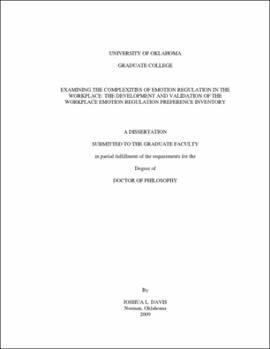| dc.description.abstract | The purpose of this study is to examine how several categories of emotion regulation strategies are related to satisfaction and performance outcomes. A measure of workplace emotion regulation was developed and validated with respect to a battery of reference measures, as well as life satisfaction, job satisfaction, and performance on a series of customer service scenarios. Overall, the results of this study showed that different categories of regulation strategies such as situation modification, situation selection, attention deployment, cognitive change, and response modulation show different relationships with job satisfaction, life satisfaction, and simulated customer service performance. Furthermore, cluster analysis indicated clear sets of preferences in emotion regulation. The four groups identified in this analysis showed significantly different means on the outcomes of interest, suggesting that individual differences in regulation preferences may be important to consider. Test development procedures as well as theoretical and practical implications of findings are discussed. | |
